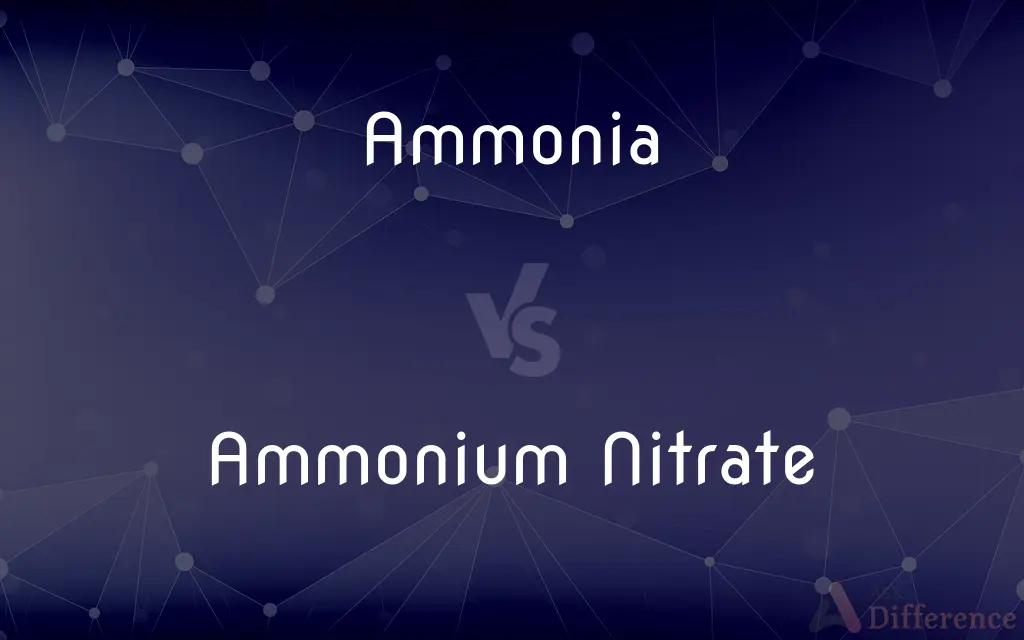Ammonia vs. Ammonium Nitrate — What's the Difference?
By Tayyaba Rehman — Published on November 20, 2023
Ammonia is a colorless gas (NH₃) used in cleaning and industry. Ammonium nitrate (NH₄NO₃) is a solid compound used as a fertilizer and explosive.

Difference Between Ammonia and Ammonium Nitrate
Table of Contents
ADVERTISEMENT
Key Differences
Ammonia is a pungent-smelling, colorless gas with the chemical formula NH₃. It is produced both naturally, through decomposition processes, and industrially. Ammonium nitrate, on the other hand, is a white crystalline solid with the formula NH₄NO₃, primarily known for its use in agriculture and, regrettably, its potential as an explosive.
Used widely in the cleaning industry, ammonia is a common ingredient in many household and industrial cleaning products. Ammonium nitrate, by contrast, serves as a popular nitrogenous fertilizer due to its high nitrogen content, making it invaluable for crops.
Ammonia can be directly applied in agriculture as a source of nitrogen for plants. However, ammonium nitrate offers a more stable and concentrated source of nitrogen, resulting in its favored status in fertilizers.
One of the most significant distinctions is in their potential hazards. While ammonia can be toxic if inhaled in large amounts, ammonium nitrate presents a risk due to its explosive properties when mixed with fuels or subjected to intense heat.
In summary, while both ammonia and ammonium nitrate are critical in agriculture and various industries, they differ fundamentally in their chemical composition, applications, and associated risks.
ADVERTISEMENT
Comparison Chart
Chemical Formula
NH₃
NH₄NO₃
Physical State
Colorless gas
White crystalline solid
Primary Use
Cleaning, refrigeration, fertilizer
Fertilizer, explosive
Hazards
Toxic when inhaled, flammable
Can explode when mixed with fuels or subjected to heat
Production
Natural processes and industrial synthesis
Synthesized from ammonia and nitric acid
Compare with Definitions
Ammonia
A colorless gas with a pungent smell.
The strong smell in the cleaning solution was due to ammonia.
Ammonium Nitrate
A white crystalline compound used in fertilizers.
Farmers use ammonium nitrate to promote healthy plant growth.
Ammonia
A base that forms ammonium ions in water.
When ammonia is dissolved in water, it forms ammonium ions and hydroxide ions.
Ammonium Nitrate
A salt formed from ammonia and nitric acid.
When ammonia reacts with nitric acid, ammonium nitrate is produced.
Ammonia
A compound with the chemical formula NH₃.
Ammonia is composed of nitrogen and hydrogen atoms.
Ammonium Nitrate
A compound with explosive properties under certain conditions.
Due to its explosive potential, the sale of ammonium nitrate is regulated.
Ammonia
A cleaning agent found in many household products.
To remove tough stains, many turn to ammonia-based cleaners.
Ammonium Nitrate
A primary source of nitrogen in agriculture.
Ammonium nitrate provides crops with essential nitrogen.
Ammonia
A substance used in fertilizers and refrigeration.
Industrial refrigeration systems often use ammonia as a cooling agent.
Ammonium Nitrate
A substance with the chemical formula NH₄NO₃.
Ammonium nitrate is synthesized by combining ammonia with nitric acid.
Ammonia
A colorless, pungent gas, NH3, extensively used to manufacture fertilizers and a wide variety of nitrogen-containing organic and inorganic chemicals. Ammonia is the chief nitrogen product excreted by fish and other aquatic animals.
Ammonia
See ammonium hydroxide.
Ammonia
(inorganic compound) A gaseous compound of hydrogen and nitrogen, NH3, with a pungent smell and taste.
Ammonia
A solution of this compound in water used domestically as a cleaning fluid.
Never use ammonia to clean metal writing pens.
Ammonia
A gaseous compound of hydrogen and nitrogen, NH3, with a pungent smell and taste: - often called volatile alkali, and spirits of hartshorn.
Ammonia
A pungent gas compounded of nitrogen and hydrogen (NH3)
Ammonia
A water solution of ammonia
Common Curiosities
What is ammonia?
Ammonia is a colorless gas with a pungent smell, commonly used in cleaning and industry.
Is ammonia dangerous?
Yes, ammonia is toxic when inhaled and can be flammable under certain conditions.
What is the primary use of ammonium nitrate?
Ammonium nitrate is mainly used as a fertilizer and, in some cases, as an explosive.
Why is ammonium nitrate favored in agriculture?
Ammonium nitrate provides a stable and concentrated source of nitrogen for crops.
Can ammonia be used as a fertilizer?
Yes, ammonia can be directly applied in agriculture as a nitrogen source.
Is the smell of ammonia harmful?
While the smell is pungent, brief exposure is generally not harmful. However, prolonged or high-concentration exposure can be toxic.
Are there regulations governing ammonium nitrate's sale?
Yes, due to its explosive potential, the sale and transport of ammonium nitrate are often regulated.
Why is ammonium nitrate explosive?
Ammonium nitrate can decompose rapidly when exposed to heat or certain chemicals, releasing gases that can cause explosions.
How is ammonium nitrate made?
Ammonium nitrate is synthesized by combining ammonia with nitric acid.
Can ammonia be found in nature?
Yes, ammonia is produced naturally during the decomposition of organic matter.
Can ammonium nitrate be used in gardens?
Yes, but it should be used carefully following recommended application rates.
Is ammonia soluble in water?
Yes, ammonia dissolves in water, forming ammonium and hydroxide ions.
What industries heavily use ammonia?
Beyond agriculture, ammonia is widely used in the cleaning industry and in refrigeration.
How should ammonium nitrate be stored?
It should be stored in a cool, dry place away from combustibles, with proper ventilation.
How do ammonia and ammonium nitrate differ?
Ammonia is a colorless gas used mainly in cleaning and industry, while ammonium nitrate is a solid compound used primarily as a fertilizer and explosive.
Share Your Discovery

Previous Comparison
Spanish Rice vs. Mexican Rice
Next Comparison
Acetic Acid vs. Ethanoic AcidAuthor Spotlight
Written by
Tayyaba RehmanTayyaba Rehman is a distinguished writer, currently serving as a primary contributor to askdifference.com. As a researcher in semantics and etymology, Tayyaba's passion for the complexity of languages and their distinctions has found a perfect home on the platform. Tayyaba delves into the intricacies of language, distinguishing between commonly confused words and phrases, thereby providing clarity for readers worldwide.














































